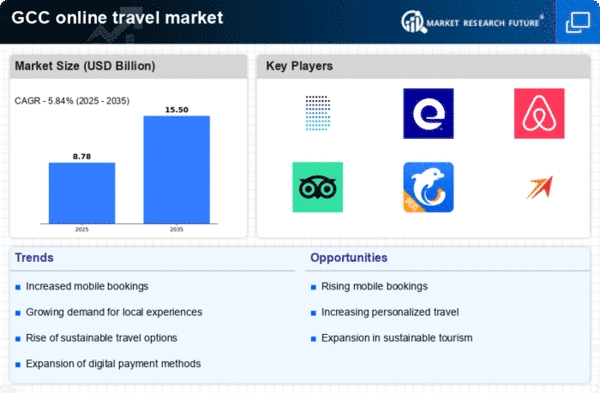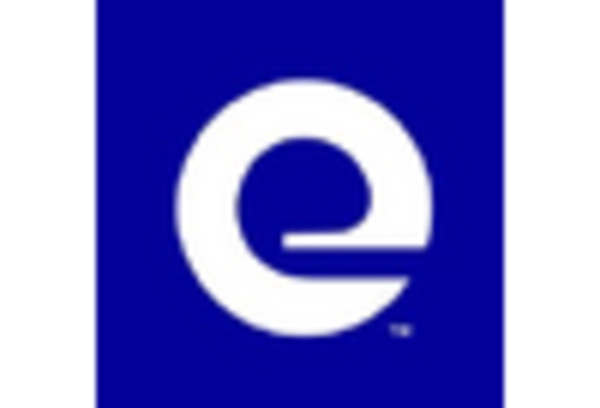The online travel market is currently characterized by a dynamic competitive landscape, driven by technological advancements and evolving consumer preferences. Key players such as Booking Holdings (US), Expedia Group (US), and Airbnb (US) are at the forefront, each adopting distinct strategies to enhance their market positioning. Booking Holdings (US) continues to innovate its platform, focusing on personalized travel experiences through advanced data analytics. Meanwhile, Expedia Group (US) emphasizes strategic partnerships, recently collaborating with local travel agencies to expand its reach in the GCC region. Airbnb (US) is also making strides by diversifying its offerings, integrating unique local experiences into its platform, thereby appealing to a broader audience. Collectively, these strategies contribute to a competitive environment that is increasingly focused on customer-centric solutions and technological integration.
The business tactics employed by these companies reflect a nuanced understanding of the market's structure, which appears moderately fragmented yet competitive. Localizing services and optimizing supply chains are pivotal tactics that enhance operational efficiency and customer satisfaction. The influence of major players is significant, as they not only set industry standards but also drive innovation that smaller entities must adapt to in order to remain relevant.
In September 2025, Booking Holdings (US) announced a strategic acquisition of a regional travel tech startup, aiming to bolster its technological capabilities and enhance user experience. This move is likely to strengthen its competitive edge by integrating cutting-edge technology into its existing platform, thus improving service delivery and customer engagement. The acquisition underscores the importance of innovation in maintaining market leadership.
In October 2025, Expedia Group (US) launched a new sustainability initiative, committing to reduce its carbon footprint by 30% over the next five years. This initiative not only aligns with global sustainability trends but also positions the company favorably among environmentally conscious consumers. By prioritizing sustainability, Expedia Group (US) is likely to attract a growing segment of travelers who value eco-friendly practices.
In August 2025, Airbnb (US) expanded its offerings by introducing a new feature that allows users to book travel experiences alongside accommodations. This strategic enhancement is indicative of a broader trend towards experiential travel, catering to consumers' desires for immersive and authentic experiences. By diversifying its portfolio, Airbnb (US) is poised to capture a larger share of the market, appealing to a demographic that seeks more than just a place to stay.
As of November 2025, the competitive trends shaping the online travel market include a pronounced focus on digitalization, sustainability, and the integration of artificial intelligence. Strategic alliances are increasingly prevalent, as companies recognize the value of collaboration in enhancing service offerings and operational efficiency. Looking ahead, competitive differentiation is expected to evolve, shifting from traditional price-based competition to a landscape where innovation, technology, and supply chain reliability are paramount. This transition suggests that companies that prioritize these elements will likely emerge as leaders in the market.

















